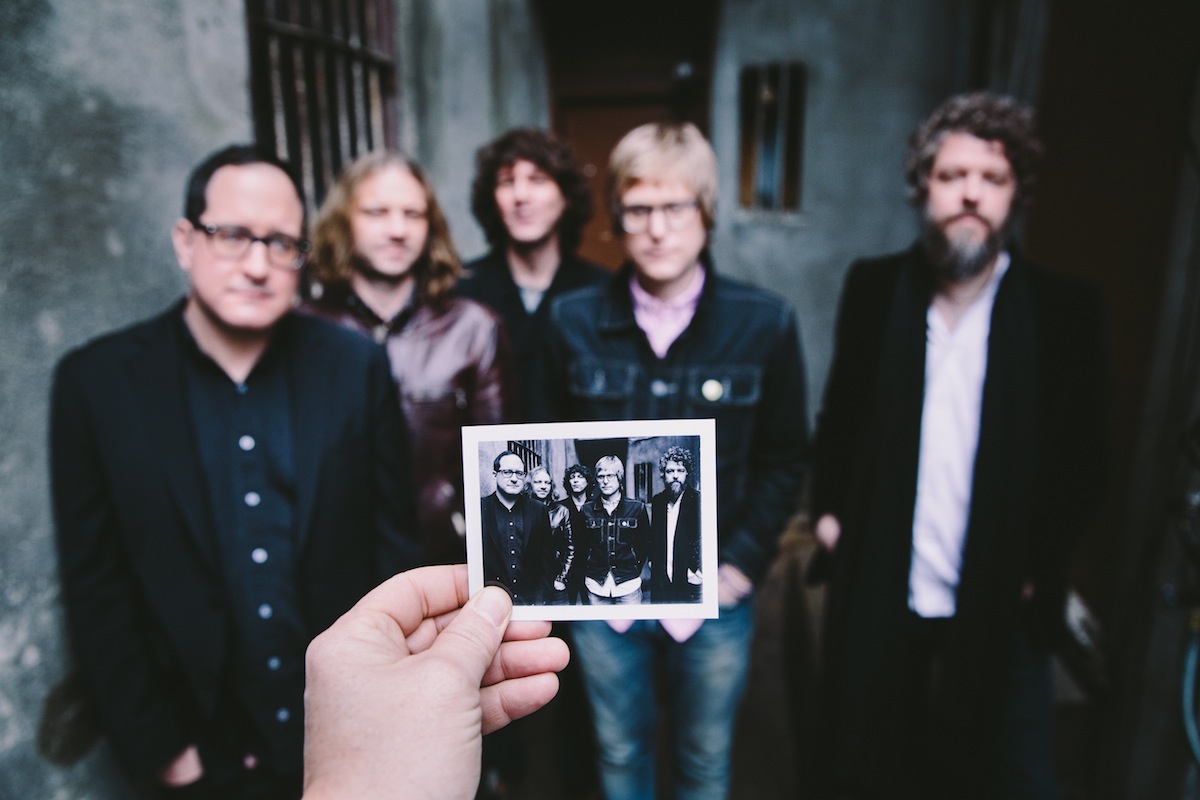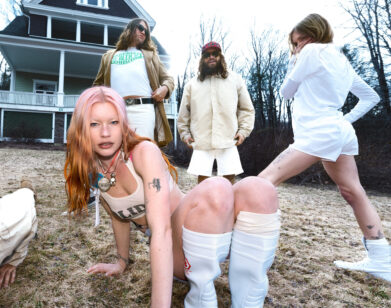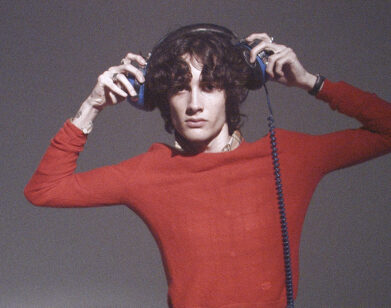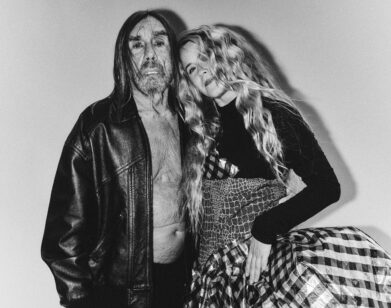The Hold Steady is Wide Awake

ABOVE: THE HOLD STEADY. PHOTO COURTESY OF DANNY CLINCH
In a typical moment of busyness and undoubtedly alcohol-aided amnesia, The Hold Steady forgot to celebrate its 10th birthday. The anniversary of the beer-swilling Brooklyn band’s humble origins rolled around in the midst of a busy 2013, and it wasn’t until February that the quintet took the time to properly commemorate the occasion. So on a cold night at Music Hall of Williamsburg (at the former site of Northsix, where they played their first show), Craig Finn, guitarist Tad Kubler, bassist Galen Polivka, drummer Bobby Drake, and recent addition Steve Selvidge ran through the hits, all the massive highs and crushing lows and killer parties that got the band to where they are today.
But as they’re looking back, they’re also looking forward. Taking some time from their Brooklyn apartments, Finn and Kubler spoke with us about the band’s storied past and exciting present—detailing how their unassuming intentions for the band laid the groundwork for its sixth full-length, Teeth Dreams (out today on Washington Square).
COLIN JOYCE: I guess I want to start at the beginning. You’ve said your goals from the start didn’t match up with how things unfolded; what were you thinking when you moved to New York and started this band?
CRAIG FINN: I moved out here and I thought moving to New York was in the absence of having a rock band. I think internally, I was married at the time and now I’m divorced, and I was putting a lot of pressure on myself to be an adult. When we started the band, when I say “low expectations,” we weren’t even going to play a show. We were just going to have this band to drink beer. Certainly we weren’t going to record. That way it keeps it fun, and it’s not a hassle. Then someone talks us into playing a show and we decide we should maybe record our songs, so everything went out the window. In some ways, I connect that with the success of the band. We were just in it to have fun, and when you have fun, things get contagious. When we started playing, there was a really low expectation on professionalism. We were drinking a lot, and partying during the shows. Almost right away, this guy came up to us and said, “You’re the first band I’ve seen in a long time that’s really smiling onstage.” I almost felt at that moment we were onto something.
TAD KUBLER: I moved to New York because Craig and I had connected again [after Lifter Puller broke up]. He was talking about playing music or wanting to. When he and I sat down and talked about where we’d want to take it, it was right in my wheelhouse. It was music that I had grown up on. It is true that when we started we didn’t have a lot of expectations or ambitions. Lifter Puller dissolving, before a larger audience got a chance to see the band, definitely helped The Hold Steady. At the same time, when you get onstage to play music, there has to be some vision to it. I had given up on the idea that I was going to play in a band that would make any kind of living, but when you play in bands, even if you let go of that hope, there’s always in the back of your mind somewhere the idea that it’s what you want to be doing. It just felt really good to be playing music again. But when we saw that people were coming out to our shows and liked our band, it was very hopeful. When you stop worrying about the other things that can go along with playing in a band and you let go and do it because it’s fun to do, things seem to work.
JOYCE: Were there any specific moments besides that where it became clear that it was going to be something far beyond what you had initially intended?
FINN: There’s a couple things. I had this band Lifter Puller in Minneapolis that was pretty popular in Minneapolis and nowhere else. Right around 2000 I moved to New York and the Internet started to happen. Lifter Puller got this post-breakup Internet thing happening. So the first show we played, there was like 100 people there, and they weren’t all people I knew. This was a lot of people who knew Lifter Puller after they broke up and wanted to see our new band. Just the fact of being in New York, the guy from Rolling Stone or The New Yorker or SPIN can show up at you shows. Things can happen quicker here.
There was this one moment I can remember. After the first record we were going to put out, Separation Sunday, we were going to have a record release show at The Bowery Ballroom. We’d sold out the Mercury Lounge before, but we hadn’t played the Bowery. At the time it was maybe a little bit of a stretch. We had this meeting about how we were going to get a reasonable amount of people into the Bowery, just so it didn’t look bad. Then Village Voice put us on the cover and we were the first rock band on the cover of Village Voice in like 10 years or something like that, and the show sold out right away. From that point on, it was just at a different level.
KUBLER: The first time we went over to the UK and to Europe and there were people at the shows, it was like, “Holy shit! This is for real, I guess we’re actually a band.” I would assume that everybody that’s ever played in a band always has this feeling that it could all be over tomorrow. For a long time, that’s why we worked at the pace we did. We wanted to make sure we were getting every possible ounce of fun and happiness out of it that we could, because it could have all been gone the next day. I think it still could be, you never know. It’s a weird job to have.
JOYCE: Were you thinking about the weird path that this band’s career has taken as you were making this album?
FINN: I think it’s all unusual. I’m always telling people I’m a normal guy who loves baseball, but I’m 42 years old, I’m unmarried, I don’t have any kids, and I’m a singer in a rock band. Maybe I’m not that normal. That’s not where most people are at my age, so I was kind of conscious of it a little bit, but at the same time you get into a room and you turn up the amps and you’re only really worried about whether it sounds good or not.
JOYCE: When did the process of this new record really begin?
FINN: When I did the solo album, the rest of the guys got together and wrote some songs in Memphis, of which at least two songs came from that. We took a break, but this is the first record that we’ve had Steve Selvidge in the band. There was a part that felt a little bit forced. We never had a guy from out of town before, so we’d fly him in and it’d be like “Okay, ready… write!” It took a little while to get used to that. We also wrote a ton of songs. With the two-guitar lineup, which ended up being the defining sound of the record, it took me a while to find my spot as far as where the vocals go. It took me a little while to get in there.
JOYCE: What were the sessions in Memphis like?
KUBLER: That was, like, January 2012. It was good. There isn’t any one particular way that we work creatively. For a lot of Separation Sunday and Boys and Girls in America, it was Bobby and I down at our rehearsal space just drinking beers and playing. It almost seemed that all of a sudden we had a bunch of songs. Because the touring for Boys and Girls was so extensive, we had to write a lot of stuff on the bus or in hotel rooms or backstage. On Heaven Is Whenever, a lot of that was me experimenting in the studio and then working as a band. Because this was the first record Steve was a part of making, we passed a lot of ideas back and forth. We had taken a break, and then Craig did the solo record. When he went on tour, I realized that the three- or four-month break was actually going to be a year. Wanting to stay in shape creatively, we went down to Memphis for a week in January and a week in February. Steve has a home studio behind his house, and it was just fun to do. It was nice to get out of town for a week and just worry about playing music. We came up with 10 or 12 songs down there.
JOYCE: Did anything you learned from making the solo record carry over to Teeth Dreams?
FINN: Yeah, The Hold Steady is such a loud band. After the last record and all the touring, I was tired, and I was kind of tired of all the volume. The solo record was way quieter. There were parts that were just me on acoustic guitar, and spiritually I think that was really good for me. It allowed me to do some more songs that were a little more mundane. With The Hold Steady, I’m always writing about these big cinematic things, and the solo thing was a little more personal and a little more vulnerable. That said, when you go out and play quiet music, people react quietly. No one is throwing a beer up in the air. Coming back to The Hold Steady is this big celebration when we play.
JOYCE: I get the sense that this record is a little more personal than past Hold Steady records, too.
FINN: There’s certainly parts of it. This song “Almost Everything” comes out of the storytelling and is more about being in a band and playing shows. It’s a window outside. It’s possible. I think there’s a little more personal in there.
KUBLER: Craig is such a phenomenal lyricist that he makes it easy. I felt more of a duty to bring in something that was really cinematic. As a lyricist, he’s so incredible. Because Craig was more separated from the process on the musical side, I really wanted to try and blow his mind when he did hear it. Craig and I have been playing music together for 15 years in two different bands.
JOYCE: Does the fact that you have this huge following now, as opposed to the pressure-free environment when you started, weigh on your mind when you’re writing these records?
FINN: You do think about it. On one level you’re always making something you like, but there’s people listening now. I am aware of it. It doesn’t feel like a lot of pressure though. It’s more positive. You know when there’s a part of the song where people are going to jump up and down or throw their beer in the air or whatever. I can’t wait to share this thing with these people.
TEETH DREAMS IS OUT TODAY VIA WASHINGTON SQUARE RECORDS. FOR MORE ON THE HOLD STEADY, PLEASE VISIT ITS WEBSITE.






